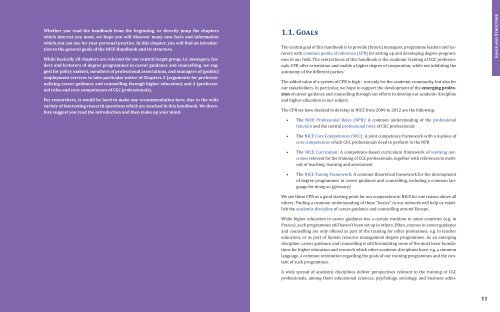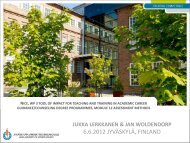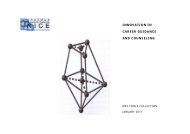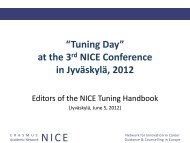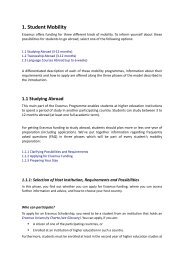NICE HANDBOOK â Academic training of Career ... - Nice-network.eu
NICE HANDBOOK â Academic training of Career ... - Nice-network.eu
NICE HANDBOOK â Academic training of Career ... - Nice-network.eu
You also want an ePaper? Increase the reach of your titles
YUMPU automatically turns print PDFs into web optimized ePapers that Google loves.
Whether you read the handbook from the beginning, or directly jump the chapterswhich interest you most, we hope you will discover many new facts and informationwhich you can use for your personal practice. In this chapter, you will find an introductionto the general goals <strong>of</strong> the <strong>NICE</strong> Handbook and its structure.While basically all chapters are relevant for our central target group, i.e. managers, leadersand lecturers <strong>of</strong> degree programmes in career guidance and counselling, we suggestfor policy makers, members <strong>of</strong> pr<strong>of</strong>essional associations, and managers <strong>of</strong> (public)employment services to take particular notice <strong>of</strong> Chapters 2 (arguments for pr<strong>of</strong>essionalizingcareer guidance and counselling through higher education) and 4 (pr<strong>of</strong>essionalroles and core competences <strong>of</strong> CGC pr<strong>of</strong>essionals).For researchers, it would be hard to make any recommendation here, due to the widevariety <strong>of</strong> interesting research questions which are touched in this handbook. We thereforesuggest you read the introduction and then make up your mind.1.1. GoalsThe central goal <strong>of</strong> this handbook is to provide (future) managers, programme leaders and lecturerswith common points <strong>of</strong> reference (CPR) for setting up and developing degree programmesin our field. The central focus <strong>of</strong> this handbook is the academic <strong>training</strong> <strong>of</strong> CGC pr<strong>of</strong>essionals.CPR <strong>of</strong>fer orientation and enable a higher degree <strong>of</strong> cooperation, while not inhibiting theautonomy <strong>of</strong> the different parties.The added value <strong>of</strong> a system <strong>of</strong> CPR is high – not only for the academic community, but also forour stakeholders. In particular, we hope to support the development <strong>of</strong> the emerging pr<strong>of</strong>ession<strong>of</strong> career guidance and counselling through our efforts to develop our academic disciplineand higher education in our subject.The CPR we have decided to develop in <strong>NICE</strong> from 2009 to 2012 are the following:◆◆The <strong>NICE</strong> Pr<strong>of</strong>essional Roles (NPR): A common understanding <strong>of</strong> the pr<strong>of</strong>essionalfunction and the central pr<strong>of</strong>essional roles <strong>of</strong> CGC pr<strong>of</strong>essionalsGoals and Structure◆◆◆◆◆◆The <strong>NICE</strong> Core Competences (NCC): A joint competence framework with a nucl<strong>eu</strong>s <strong>of</strong>core competences which CGC pr<strong>of</strong>essionals need to perform in the NPRThe <strong>NICE</strong> Curriculum: A competence-based curriculum framework <strong>of</strong> learning outcomesrelevant for the <strong>training</strong> <strong>of</strong> CGC pr<strong>of</strong>essionals, together with references to methods<strong>of</strong> teaching, learning and assessmentThe <strong>NICE</strong> Tuning Framework: A common theoretical framework for the development<strong>of</strong> degree programmes in career guidance and counselling, including a common languagefor doing so (glossary)We see these CPR as a good starting point for our cooperation in <strong>NICE</strong> for one reason above allothers. Finding a common understanding <strong>of</strong> these “basics” in our <strong>network</strong> will help us establishthe academic discipline <strong>of</strong> career guidance and counselling around Europe.While higher education in career guidance has a certain tradition in some countries (e.g. inFrance), such programmes still haven’t been set up in others. Often, courses in career guidanceand counselling are only <strong>of</strong>fered as part <strong>of</strong> the <strong>training</strong> for other pr<strong>of</strong>essions, e.g. in teachereducation, or as part <strong>of</strong> human resource management degree programmes. As an emergingdiscipline, career guidance and counselling is still formulating some <strong>of</strong> the most basic foundationsfor higher education and research which other academic disciplines have, e.g. a commonlanguage, a common orientation regarding the goals <strong>of</strong> our <strong>training</strong> programmes and the content<strong>of</strong> such programmes.A wide spread <strong>of</strong> academic disciplines deliver perspectives relevant to the <strong>training</strong> <strong>of</strong> CGCpr<strong>of</strong>essionals, among them educational sciences, psychology, sociology, and business admi-11


